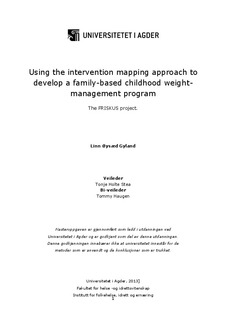Using the intervention mapping approach to develop a family-based childhood weight-management program : the FRISKUS project
Master thesis
Permanent lenke
http://hdl.handle.net/11250/138875Utgivelsesdato
2013Metadata
Vis full innførselSamlinger
Sammendrag
WHO classify obesity as one of the greatest public health challenges of the 21st century. In Norway 17% of the children aged 6-11 years are overweight or obese. This is of major concern, because childhood obesity is strongly associated with risk factors as cardiovascular disease and type 2 diabetes. The aim of this master thesis is to describe the systematic development of an intervention program, FRISKUS, to be used in the municipalities to improve lifestyle habits among overweight children, aged 6-10 years old. The Intervention mapping protocol (IM) was used as a framework for effective decision making. IM is based on the importance of developingtheory- and evidence-informed programs, taking an ecological approach to assessing and intervening in health-problems. As a part of the IM process, semi-structured interviews with parents and focus-group interviews with school nurses were conducted. In addition, the literature were searched for empirical evidence and related theories. Firstly in this paper the background for the selected topic is described. Furthermore, I will present the prevalence, causes and consequences of childhood overweight and obesity. The theoretical fundament and the method Intervention mapping will be described. Finally, results, discussion and conclusion will be presented. This paper has resulted in an article which describes the systematic development of a family-based childhood weight management program.
Beskrivelse
Masteroppgave i folkehelsevitenskap – Universitetet i Agder 2013
